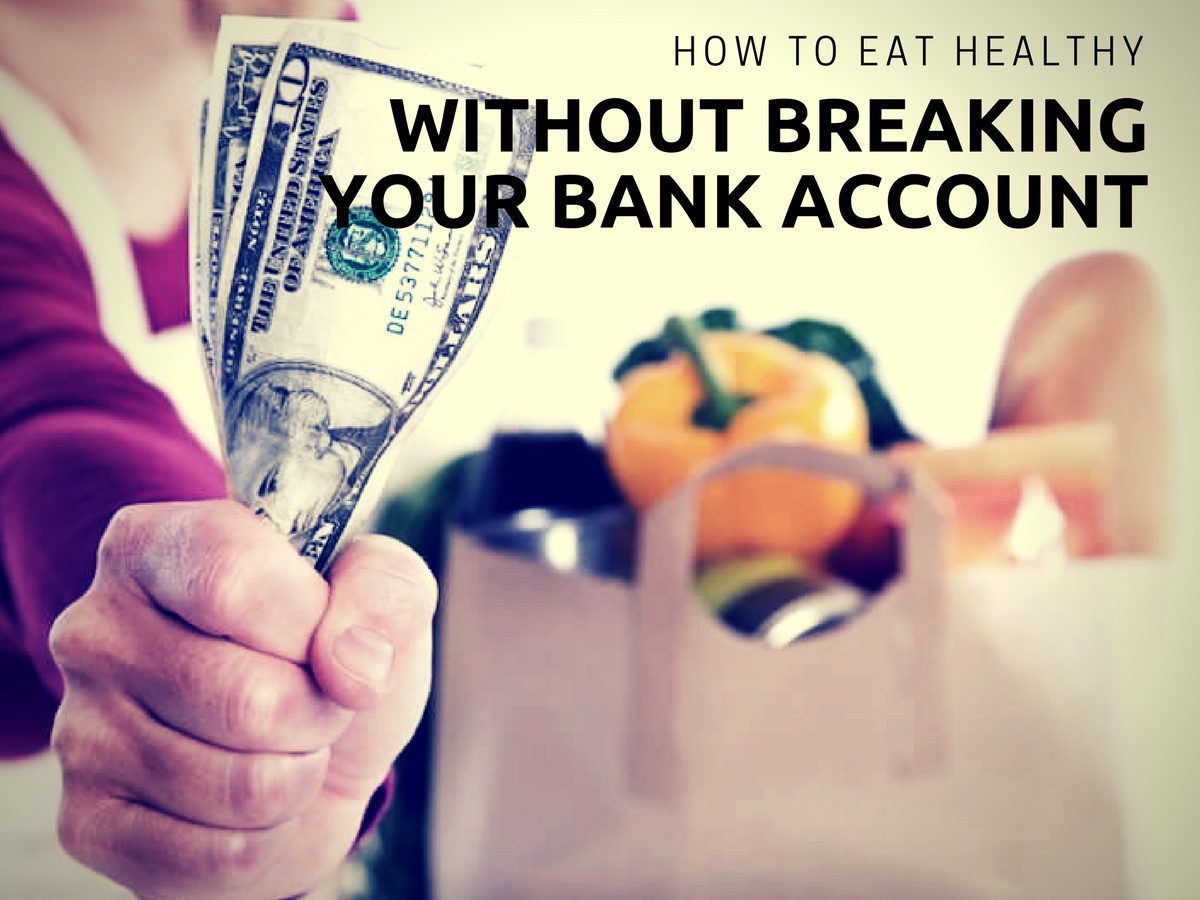How to Eat Healthy Without Breaking Your Bank Account
Whether it’s a legitimate excuse or not, I have come across a handful of people in my day, who say they can’t change their diet to a healthier menu because “Eating healthy is expensive!”
For sure, a grass-fed, organic steak or wild salmon is more expensive than smokies and frozen fish sticks, but there are ways to eat healthy that don’t have to break your wallet.
Here are some tips to get you going in the right direction:
“Love food, hate waste”
Those who eat healthier waste more food, says a recent study.
This is evidently because processed foods have a longer (possibly infinite) shelf life—(remember that documentary that proved that McDonald’s fries never get moldy?)
Whereas fresh veggies and meat go bad if you don’t eat them fast enough.
This website—Love Food, Hate Waste offers creative recipe ideas for what to do with the scraps of food in your fridge
Things like wilted veggies that have seen better days.
Note: I did not say rotten veggies.
I mean vegetables that look like they’re slightly past their prime and don’t belong in a crisp salad.
Many times, they can be refurbished into things like stir fry or pureed soup, for example.
Or here’s another great one:
Ever tried sautéed salad?
I know it sounds weird, but wilted salad tastes pretty good fried up the next morning.
Add some more spinach to it, and then plop a sunny-side-up egg, or two, or three, on top and let the yolk do its magic on the refurbished salad.
On a similar note, keeping your fridge and pantry organized and tidy will ensure you don’t shove perfectly good food to the back of the fridge, only to be forgotten about until it’s too late.
Same goes for frozen food:
Make sure you go through your freezer periodically and take inventory.
Freezer burned food isn’t amazing and often ends up in the garbage.
Abandon your shopping list?
I know this sounds scary, but have you ever been grocery shopping with the intention of making steaks that night, and when you get there you see there’s a really good deal on chicken thighs.
But your heart was set on steak so you buy the overpriced steak instead of the chicken thighs?
Might be worth going shopping without a list, and being open-minded to where the good deals are at that day.
Go to the farmer’s market at the end of the day
Secret: Sometimes at the end of the day, things go on sale at Farmer’s markets.
Vendors are desperate to get rid of their ripe tomatoes they know won’t last another week, so they put them on sale for 50 percent off in the final hour of the day.
Yes, you’ll probably have to use the tomatoes within a day or two, but worst comes to worst, you put them into a chilli or tomato sauce.
Buy a whole cow or pig
Or go in with a friend or two to buy a third of a cow each.
It’s a big purchase up front, but you’ll get all sorts of interesting cuts and you will save some money over the long term.
It’s also a great way to source out high-quality meats from a farm and farmer you trust.
Shop at multiple stores
Sometimes one grocery store has great prices for produce, but they jack up their meat prices, and vice versa.
Do some research and find out the best places to buy different types of foods.
Yes, it might mean you have to make two or three stops at various stores, but it could easily save you a couple hundred dollars a month.
Eggs over meat
You know you’re supposed to eat protein with every meal, but this doesn’t have to be meat all the time.
Eggs are a great, more economical protein source, and can be turned into all sorts of great things.
Organic isn’t always necessary
If you think eating healthy means you need everything to be organic, think again.
A while ago, we put out a blog that explained which vegetables and fruits you really should buy organic (because of toxins and pesticides etc), and which ones do not need to be organic.
Don’t waste your money on organic produce if you don’t need to.
In short, don’t bother buying organic:
- Carrots
- Onions (Onions are much lower in pesticide residue than other vegetables)
- Avocados (The thick peel protects the goodness)
- Pineapple
- Asparagus (The vegetable the least likely to contain pesticide residue)
- Grapefruit
- Mangos
- Kiwi (seldom sprayed with pesticides and is on the top 10 most clean fruits and vegetable list)
- Mushrooms
- Sweet peas
- Papayas
- Cantaloupe
However, it might be worth spending the extra money on organic:
- Liver
- Apples
- Tomatoes
- Strawberries
- Grapes
- Celery
- Spinach
- Peppers
- Cucumbers
- Peaches/nectarines
In-season produce
Buying strawberries in the winter, for example, is expensive.
In the summer, significantly less expensive, right?
In short, choose recipes that have produce that are in season only!
Worst comes to worse, if you want strawberries in a smoothie all winter, buy them in-season and then freeze a ton of them to keep you going all winter.
Shop at ethnic markets
I have discovered that ethnic supermarkets, be it Chinese or Greek or Lebanese are a great source and great value for some interesting new ingredients.
Do some research to discover new places to shop: You might just find some gems.
Don’t be shy: Share your best eating healthy on a budget tips with the community, so we can all save money and become healthier in the process.







